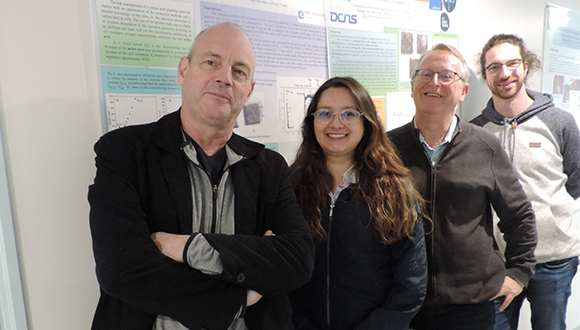Fri, 08 December, 2023
NSIRC PhD student Adriana Castro Vargas, has completed a three-month placement at LaSIE (Laboratory of Engineering Sciences for Environment), La Rochelle Université, France.
During her research placement, Adriana worked on examining the performance of thermally sprayed aluminium (TSA) coatings in a simulated offshore environment.
Her research focused on determining the damage tolerance of the coatings using multiple-coupon electrodes.
She collaborated with prominent marine corrosion researchers: Philippe Refait, Marc Jeannin and Malo Duportal and was impressed by their exceptional work, professionalism, mentorship, and interpersonal skills.
Adriana expressed her gratitude for the financial support she received from the Lloyd's Register Foundation NEST grant, which covered her flights and part of her living expenses during her stay in France.
She said, "Without this support, she would not have been able to fully immerse herself in the culture and make the most of her time in France. The research experience has not only helped me professionally but also personally."
Adriana joined the NSIRC PhD programme in January 2021 as a student with the University of Leicester, UK, on the ProCoat project, sponsored by Lloyd's Register Foundation.
Her industrial doctorate focuses on determining the damage tolerance of sacrificial coatings used in offshore wind turbines.
Thermally sprayed aluminium (TSA) is a type of coating that is often used to protect steel from damage in marine environments. Even if there is some damage during installation, TSA can still protect the steel because it is more active than the steel itself.
Most studies have looked at small areas of damage, but there is not much information about how much damage TSA can tolerate.
Adriana is researching how TSA works to protect steel when there is significant damage, using innovative methods that involve monitoring the surface activity in real-time, a rotating cylinder electrode, multi-coupon electrodes and numerical simulations.
To contact Adriana about her research, connect on LinkedIn, or email enquiries@nsirc.co.uk.
 From left: Philippe Refait, Adriana Castro Vargas, Marc Jeannin, Malo Duportal. Photo: Adriana Castro Vargas/NSIRC
From left: Philippe Refait, Adriana Castro Vargas, Marc Jeannin, Malo Duportal. Photo: Adriana Castro Vargas/NSIRC